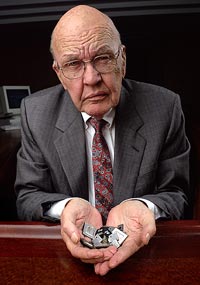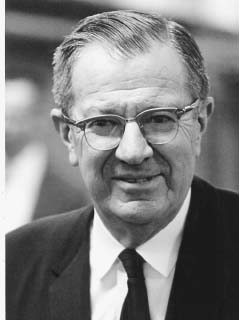Related Research Articles

Robert Norton Noyce, nicknamed "the Mayor of Silicon Valley", was an American physicist and entrepreneur who co-founded Fairchild Semiconductor in 1957 and Intel Corporation in 1968. He is also credited with the realization of the first monolithic integrated circuit or microchip, which fueled the personal computer revolution and gave Silicon Valley its name.
Silicon Valley is a region in Northern California that serves as a global center for high technology and innovation. Located in the southern part of the San Francisco Bay Area, it corresponds roughly to the geographical Santa Clara Valley. San Jose is Silicon Valley's largest city, the third-largest in California, and the tenth-largest in the United States; other major Silicon Valley cities include Sunnyvale, Santa Clara, Redwood City, Mountain View, Palo Alto, Menlo Park, and Cupertino. The San Jose Metropolitan Area has the third-highest GDP per capita in the world, according to the Brookings Institution, and, as of June 2021, has the highest percentage of homes valued at $1 million or more in the United States.

Jack St. Clair Kilby was an American electrical engineer who took part in the realization of the first integrated circuit while working at Texas Instruments (TI) in 1958. He was awarded the Nobel Prize in Physics on December 10, 2000. Kilby was also the co-inventor of the handheld calculator and the thermal printer, for which he had the patents. He also had patents for seven other inventions.
The Lemelson-MIT Program awards several prizes yearly to inventors in the United States. The largest is the Lemelson–MIT Prize which was endowed in 1994 by Jerome H. Lemelson, funded by the Lemelson Foundation, and is administered through the School of Engineering at the Massachusetts Institute of Technology. The winner receives $500,000, making it the largest cash prize for invention in the U.S.
Fairchild Semiconductor International, Inc. was an American semiconductor company based in San Jose, California. Founded in 1957 as a division of Fairchild Camera and Instrument, it became a pioneer in the manufacturing of transistors and of integrated circuits. Schlumberger bought the firm in 1979 and sold it to National Semiconductor in 1987; Fairchild was spun off as an independent company again in 1997. In September 2016, Fairchild was acquired by ON Semiconductor.

The traitorous eight was a group of eight employees who left Shockley Semiconductor Laboratory in 1957 to found Fairchild Semiconductor. William Shockley had in 1956 recruited a group of young Ph.D. graduates with the goal to develop and produce new semiconductor devices. While Shockley had received a Nobel Prize in Physics and was an experienced researcher and teacher, his management of the group was authoritarian and unpopular. This was accentuated by Shockley's research focus not proving fruitful. After the demand for Shockley to be replaced was rebuffed, the eight left to form their own company.
In eighteenth and nineteenth century German philosophy, Zeitgeist is an invisible agent or force dominating the characteristics of a given epoch in world history.
Jerome "Jerry" Hal Lemelson was an American engineer, inventor, and patent holder. Several of his inventions and works in the fields in which he patented have made possible, either wholly or in part, innovations like automated warehouses, industrial robots, cordless telephones, fax machines, videocassette recorders, camcorders, and the magnetic tape drive used in Sony's Walkman tape players. Lemelson's 605 patents made him one of the most prolific inventors in American history.
Jean Amédée Hoerni was a Swiss-American engineer. He was a silicon transistor pioneer, and a member of the "traitorous eight". He developed the planar process, an important technology for reliably fabricating and manufacturing semiconductor devices, such as transistors and integrated circuits.
Jay Taylor Last was an American physicist, silicon pioneer, and member of the so-called "traitorous eight" that founded Silicon Valley.

The Tech Interactive is a science and technology center that offers hands-on activities, labs, design challenges and other STEAM education resources. It is located in downtown San Jose, California, adjacent to the Plaza de César Chávez.

Frederick Emmons Terman was an American professor and academic administrator. He is widely credited as being the father of Silicon Valley.

Jen-Hsun "Jensen" Huang is a Taiwanese-American billionaire business magnate, electrical engineer, and co-founder of Nvidia Corporation, where he currently serves as president and CEO.
Grant Oscar Gale was the S.S. Williston Professor of physics at Grinnell College in Grinnell, Iowa, the curator of Grinnell's Physics Historical Museum, and the namesake of the Grant O. Gale Observatory on the Grinnell campus.
The Lemelson Foundation is a private 501(c)(3) philanthropy founded in 1993 by Jerome H. Lemelson and his wife Dorothy.
The University of Utah Research Park, also known as Bionic Valley, is located on the campus of the University of Utah in Salt Lake City, United States. The facility has helped create many businesses based on the work of university scientists over the years. Research Park now houses more than forty companies alongside sixty-nine academic departments and employs more than 7,500 people. The annual in-state productivity of park residents exceeds $550 million.
David Clark Brewster is an American journalist and the founder, editor and publisher of the Seattle Weekly and the Northwest news website Crosscut.com. He is also the founder, creator and former executive director of the nonprofit cultural center Town Hall Seattle.

Vivek Wadhwa is an American technology entrepreneur and academic. He is Distinguished Fellow & Adjunct Professor at Carnegie Mellon's School of Engineering at Silicon Valley and Distinguished Fellow at the Labor and Worklife Program at Harvard Law School. He is also author of books Your Happiness Was Hacked: Why Tech Is Winning the Battle to Control Your Brain—and How to Fight Back, Driver in the Driverless Car,Innovating Women: The Changing Face of Technology, and Immigrant Exodus.
The first planar monolithic integrated circuit (IC) chip was demonstrated in 1960. The idea of integrating electronic circuits into a single device was born when the German physicist and engineer Werner Jacobi developed and patented the first known integrated transistor amplifier in 1949 and the British radio engineer Geoffrey Dummer proposed to integrate a variety of standard electronic components in a monolithic semiconductor crystal in 1952. A year later, Harwick Johnson filed a patent for a prototype IC. Between 1953 and 1957, Sidney Darlington and Yasuo Tarui proposed similar chip designs where several transistors could share a common active area, but there was no electrical isolation to separate them from each other.
Elizabeth Noyce was an American philanthropist, and former wife of Fairchild Semiconductor general manager and a founder of Intel Corporation, Robert Noyce.
References
- ↑ "Silicon Valley Archives". Stanford Libraries. Retrieved 2018-01-07.
- ↑ Berlin, Leslie (2005). The Man Behind the Microchip: Robert Noyce and the Invention of Silicon Valley . Oxford University Press. pp. 440. ISBN 978-0-19-516343-8.
- ↑ "Center for Advanced Study in the Behavioral Sciences". Stanford University.
- ↑ "Jerome and Dorothy Lemelson Center for the Study of Invention and Innovation".
- ↑ Biggs, John. "Historian Leslie Berlin talks about the rise of Silicon Valley". TechCrunch. Retrieved 2018-01-07.
- ↑ "Archivist Leslie Berlin Tackles Silicon Valley's Past in 'Troublemakers'". WIRED. Retrieved 2018-01-07.
- ↑ "The New Book That Puts Tech's Sexism Scandals Into Perspective". Fortune. Retrieved 2018-01-18.
- ↑ "Full transcript: Historian and author Leslie Berlin on Recode Decode". Recode. Retrieved 2018-01-18.